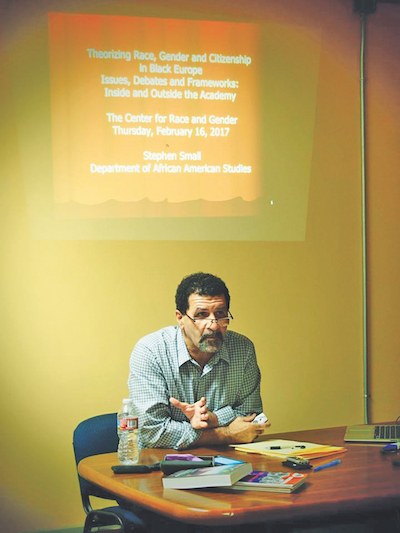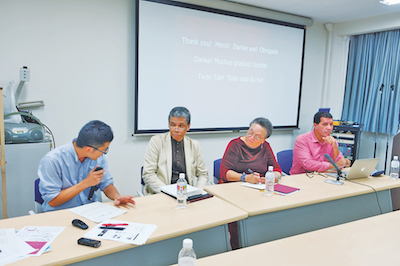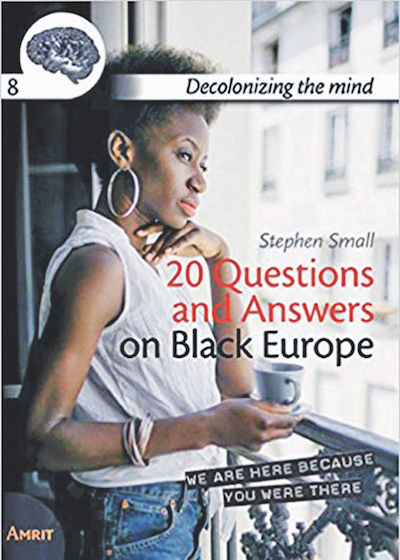Celebrating the role of Africans in Europe

SPREADING THE MESSAGE: Protestors taking part in an anti-racism march in Madrid
CONTRARY TO what mainstream media would have you believe, there is a large population of black people living in Europe – over seven million, in fact.
Migrants from Africa and the Caribbean have travelled to the continent over the centuries, which has resulted in sizeable black communities existing across France, Britain, Spain, Portugal and Holland.
However, in the present age of Brexit where there are ongoing tensions regarding immigration, diversity and inclusion, it’s hard to feel a sense of community and shared reality.
But what is key to the black diaspora, wherever we are placed across the globe, is our united focus on enlightenment and celebration, much of which is a response to our shared experience of oppression as a people and devaluing of our history.
A scholar who is determined to represent and celebrate our existence as African people is Dr Stephen Small, a renowned academic who specialises in sociology, race and the African diaspora.

PICTURED: Dr Small says that despite being colonialism and the effects of slavery black people have always found ways to connect
Throughout his career as an academic and community activist, Small has made it his priority to reveal the lived experience of Africans, challenge rhetoric that paints Africans, and challenge narratives that views Africans as problematic, subservient and less able than Europeans.
The Voice spoke to Dr Small about the launch of his book, 20 Questions and Answers on Black Europe (Decolonising the Mind).
Inclusion and representation
“Often, black people are ignored and presented as a problem” says Dr Small.
“So bringing black people to the centre of debate in Europe is key.
“Through engaging in political, economic and social debate we can begin to affect change as a nation where we can focus on black initiatives, programmes and activities that challenge racism and oppression, much of which is still very much alive and rife in current times.”
Europe is made up of at least 46 nations, and a population of more than 770 million people.
Black people of African descent are estimated at more than seven million, with at least 90 per cent of them living in just 12 nations.
Dr Small’s book offers an in-depth analysis of their experiences as members of a minority community in Europe.
The academic addresses questions about history and the legacies of slavery, colonialism and imperialism; the politics of racism, economics, the legal system, black people’s relations with other people of colour in Europe, and some of the future challenges that will face them.
The black presence in Europe
“For centuries, black people have been restricted by boundaries, and the effects of slavery, imperialism and colonialism are very apparent,” Dr Small says.

EDUCATION: Dr Stephen Small (far right) taking part in a recent panel discussion
“Despite this, they have always found ways to connect and convene. The book aims to highlight this, shining a light on the many places across Europe where Africans exist and thrive, in addition to defining black Europe and addressing an array of questions, surrounding gender, racism, political representation, economics and more.
“Historically, all countries worked together articulating and implementing ideas of racism, and this is why a majority of people in the African diaspora speak Spanish, Portuguese and English – this was all a part of the European enterprise.
“These nations were in competition with each other to dismantle and control the black identity where white people should be on top and black people and others should exist to provide labour and be at the bottom.
“Thousands of Caribbean men and women were recruited to rebuild Britain after the war in addition to existing across Europe, as was the case in both France and Portugal. Each nation tells us that we are different, but let’s begin to look at the common issues that unite us as a community.”
Dr Small continues: “We talk about the specific problems black people face in different parts of Europe, but racism is a global European phenomena which represents the multiple ways nations have worked collectively to enslave, capture and disable African identities.
“There is not a solution at the national level, we can’t end the particular problems that blacks face in England, we need to dismantle the racism that exists across Europe.”
The black presence in Europe is undeniable; government officials, athletes, actors and entertainers exist in their numbers, and according to the European Union there are over 12 million African or African Caribbeans across the continent. Although the largest majority of Africans exist in France and the UK, Africans are still highly visible in Italy, Finland, Ireland, Belgium and Spain.
Through conferences and events, Africans mobilise to address and share their history, experiences, aspirations and establishing contacts. This is seen through events such as the Annual Summer School on Black Europe, a two-week intensive education programme in Amsterdam, that examines the contemporary circumstances of the African diaspora in Europe, The New Urban Collective, an initiative of young black people in The Netherlands and, most recently, the Annual Black Feminism, Womanism and the Politics of Women of Colour in Europe event, which seeks to highlight black feminist resistance and understand what activism looks like.
Although these events happen, more work is still needed to understand the shared experience of the African diaspora in Europe and the challenges and priorities for the future.
Taking political action
Dr Small adds: “In the UK and England, Africans often compare themselves to African Americans. But the reality is we have more in common with black people in Europe than black people in the States.
“Although we can feel inspired and motivated by the achievements of African Americans, our journeys are very different.
“If we look at 12 nations in Europe where the vast majority of black people live, we have over 4,000 nationally elected politicians, of whom only 23 are black people.
“Of those 23, a total of 18 of them are in England. This raises questions as to why is there more black political representation in Britain than anywhere else in Europe?

“We arrived in England, we spoke English, we forced race on the agenda. From Liverpool to London, to Leeds to Leicester, black people in England look worse off than those in the USA. Yet we are doing far better politically and economically compared with black people elsewhere in Europe.
“Black people in other parts of Europe are currently borrowing from Britain. We were forced to talk about race through racism, which led to race being on the agenda.
“We challenged Europe to be more democratic and socially just, for everyone. Now it’s on the agenda, we are trying to keep it there, this is slowly emerging across the continent in nations like Germany, Portugal, Italy and France.
“By mobilising to analyse the issues we face, it helps us to build alliances with other communities and nations and exchange ideas in both theory and practice.”
Decolonisation work
“Our priority is self-determination, to affirm our black humanity across the nation, enabling us to live our lives without having to think about racism. This includes living, growing and cultivating families and careers,” says Dr Small.
“However, this very notion has been and continues to be almost alien to the rest of the world. In schools and colleges across Europe, there was nothing positive about black people. We were taught that black people were inferior and dependent on white people. We were taught to despise Africa.
“And because the education systems failed us in Britain, we turned to reggae music where we heard and saw slave resistance and social activism in Jamaica via Sam Sharpe and Paul Bogle, The civil rights movements, Black Power and black feminism in the US and anti-colonial and anti-apartheid struggles in Africa.
“Much of this continues today, and what this means is that there is urgent need to overturn the education system that continues to feed these colonial ideas.”
The silence still exists. In Sweden, for example, despite often repeated, they say they had nothing to do with colonialism, as do politicians in Norway and Denmark.
And yet, as Dr Small demonstrates, this is totally incorrect. These nations established companies to colonise Africa, but they could not compete with Britain, France and Spain. But they supported and benefited, economically and politically, from colonialism. Many European nations embraced racism, supported the imposition of Christianity and continued to oppress African people.
For Dr Small, continuing the conversation about our presence, contributions and legacies as African people is very important.
He, along with other British born black educators and activists such as Tony Warner, are pioneering the type of work that aims to inspire and motivate the black community to uncover the truth about our history and continue on the journey of making longterm change for our collective future as a community.
The academic is keen to continue this work and he aims to write another book, 20 Questions and Answers on Black Britain and 20 Questions and Answers on Black Liverpool in the near future.
He also believes that we as Africans need to continue knowledge production in its many forms, such as music, film, literature, arts, science and more.
“We should not be discouraged or accept our current realities, only by documenting our lived experience can we continue to challenge and dismantle the current systems of thinking. From the UK to Netherlands to Sweden and Italy, Africans have created lives and legacies that have differences, but also many similarities.”
20 Questions and Answers on Black Europe is now available via Amazon.
Read every story in our hardcopy newspaper for free by downloading the app.






